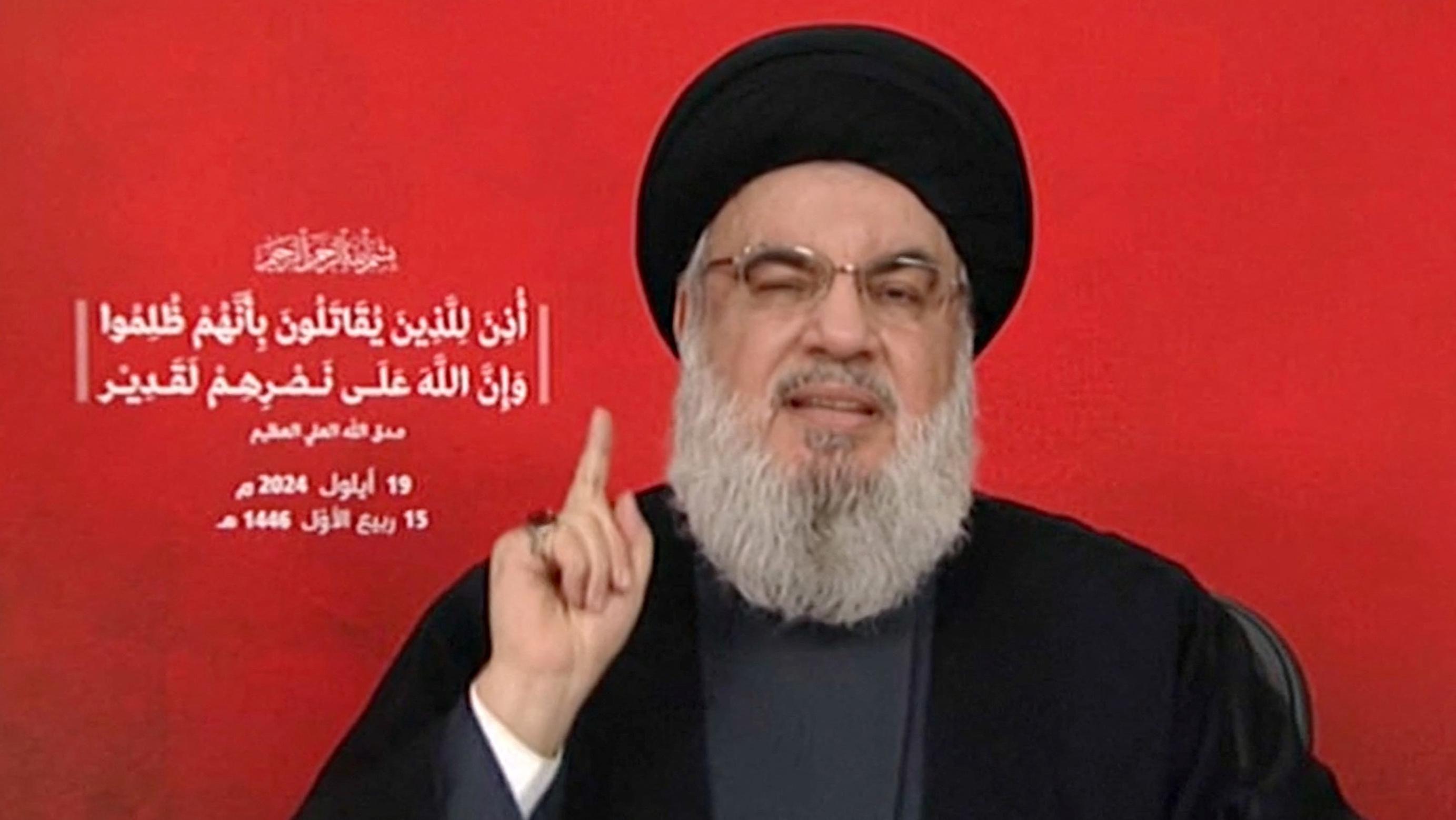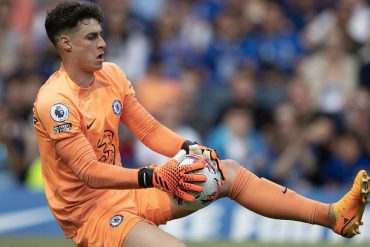
Sheikh Hassan Nasrallah, di leader of Lebanon militant Shia Islamist Hezbollah movement, na one of di best known and most influential figures in di Middle East.
Dem neva see Nasrallah in public for years becos of fear of assassination by Israel.
And on Saturday, Israeli military tok say dem don kill Nasrallah for di overnight strike on Beirut.
Hezbollah don confam di death of dia leader.
Di group say dia leader Nasrallah don ‘pass away’ for one raid wey happun for southern suburb.
“His Eminence, di Master of Resistance, di righteous servant, don pass away to be wit im Lord,” di statement tok.
Di group also “pledge” to fight against Israel and kontinue dia support for “Gaza and Palestine, and to defend Lebanon and di steadfast and honourable pipo”.
- ‘Rape me instead of my daughters’ – women tok about Sudan horrific war
- Map show where Israeli strikes on Hezbollah hit as over 400 pipo die for deadliest day of conflict in 20 years
- Canada new immigration policy for international students, foreign workers and dia spouses
One dark figure wit close personal links to Iran, e dey play key role in turning Hezbollah into di political and military force e become today – and remain respected by di group supporters.
Under Nasrallah leadership, Hezbollah don help train fighters from di Palestinian armed group Hamas, as well as militias in Iraq and Yemen, and obtain missiles and rockets from Iran for use against Israel.
E start Hezbollah evolution to become militia founded to fight Israeli troops occupying Lebanon into military force stronger dan di Lebanese army, powerbroker in Lebanese politics, major provider of health, education and social services, and key part of am backing Iran drive for regional supremacy.
Born in 1960, Hassan Nasrallah grow for Beirut eastern Bourj Hammoud neighbourhood, wia im papa Abdul Karim run small greengrocers.
Na im be di eldest of nine children.
Im join di Amal movement, den Shia militia, afta Lebanon fall into civil war in 1975. Afta short spell in di Iraqi holy city of Najaf to attend Shia seminary he rejoin Amal in Lebanon bifor im and odas comot from di group in 1982, shortly afta Israel invaded Lebanon in response to attack by Palestinian militants.
Di new group, Islamic Amal, receive considerable military and organisational support from Iran Revolutionary Guards base in di Bekaa Valley, and become as di most prominent and effective of di Shia militias wey later form Hezbollah.
In 1985, Hezbollah officially announce dia establishment by publishing “open letter” wey identify di US and di Soviet Union as Islam principal enemies and call for the “removal” of Israel, wey dem tok say e dey occupy Muslim lands.
Nasrallah work im way up through Hezbollah ranks as di organisation grow. E tok say afta e serve as fighter e become di director in Baalbek, den di whole Bekaa region, followed by Beirut.
E become leader of Hezbollah in 1992 at di age of 32, afta dem kill im predecessor Abbas al-Musawi inside on Israeli helicopter strike.
One of im first actions na retaliate to di killing of Musawi. E order rocket attack into northern Israel wey kill one girl, dem kill oneIsraeli security officer at di Israeli embassy in Turkey by car bomb and suicide bomber struck di Israeli embassy in Buenos Aires, Argentina, killing 29 pipo.
Nasrallah also manage low-intensity war witt Israeli forces wey end wit dia withdrawal from southern Lebanon in 2000, though im suffer di lost of im eldest son Hadi wey die in firefight wit Israeli troops.
Following di withdrawal Nasrallah proclaim say Hezbollah don achieve di first Arab victory against Israel. E also promise say Hezbollah no go scatta, saying dat “all dem must restore all Lebanese territory”, including di Shebaa Farms area.
There was relative calm until 2006, wen Hezbollah militants launch cross-border attack wia eight Israeli soldiers die and dem kidnap two odas, causing massive Israeli response.
Israeli warplanes bomb Hezbollah strongholds in di South and in Beirut southern suburbs, while Hezbollah fire about 4,000 rockets at Israel. More dan 1,125 Lebanese, most of dem civilians, die during di 34-day conflict, as well as 119 Israeli soldiers and 45 civilians.
Nasrallah home and offices dey targeted by Israel warplanes, but e survive untouch.
In 2009, Nasrallah issue new political manifesto wey seek to highlight Hezbollah “political vision”. It drop di reference to one Islamic republic wey dem establish in di 1985 document, but maintain tough line against Israel and di US and reiterated say Hezbollah need to keep im weapons despite UN resolution wey ban dem in southern Lebanon.
“Pipo evolve. Di whole world change ova di past 24 years. Lebanon change. Di world order change,” Nasrallah tok.
Four years later, Nasrallah declare say Hezbollah dey enta “completely new phase” of dia existence by sending fighters into Syria to help dia Iran-backed ally, President Bashar al-Assad, put down rebellion. “Na our battle, and we dey up to am,” e tok.
Lebanese Sunni leaders accuse Hezbollah of dragging di kontri into Syria war and sectarian tensions worsened dramatically.
In 2019, deep economic crisis in Lebanon triggered mass protests against political elite long accused of corruption, waste, mismanagement and negligence. Nasrallah initially express sympathy wit di calls for reforms, but im attitude changed as di protesters begin demand for complete rebuild of di political system.
On 8 October 2023 – di day afta di unprecedented attack on Israel by Hamas gunmen wey cause di war in Gaza – previously sporadic fighting between Hezbollah and Israel escalated.
Hezbollah fire at Israeli positions, in solidarity wit di Palestinians.
In one speech in November, Nasrallah tok say di Hamas attack na “100 percent Palestinian in terms of both decision and execution” but di firing between im group and Israel dey “very important and significant”.
Di group launch more dan 8,000 rockets at northern Israel and di Israeli-occupy Golan Heights. Dem also fire anti-tank missiles at armoured vehicles and attack military targets wit explosive drones.
Di Israel Defense Forces (IDF) retaliate wit air strikes and tank and artillery fire against Hezbollah positions in Lebanon.
During one recent speech, Nasrallah blame Israel for detonating thousands of pagers and radio handsets wey Hezbollah members dey use, e kill 39 pipo and injure thousands more, and e tok say dem don “cross all red lines”. E acknowledged say di group don suffer “unprecedented blow”.
Shortly aftawards Israel dramatically begin attack Hezbollah, launching waves of bombing wey nearly kill 800 pipo.









